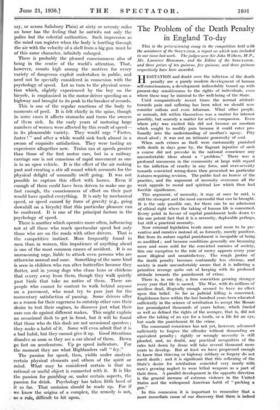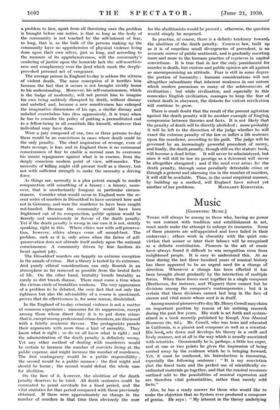The Problem of the Death Penalty in England To-day
This is the prize-winning essay in the competition held with the assistance of the SPECTATOR, a report on which was included in our issue last week. The judges were Sir John Withers, M.P., Mr. Laurence Housman, and the Editor of the SPECTATOR, and three prizes of ten guineas, five guineas, and three guineas respectively have been awarded. HESITATION and doubt over the infliction of the death penalty are a purely modem development of human self-consciousness, a development indissolubly bound up with present-thy sensitiveness to the rights of individuals, even where these may be inimical to the well-being of the State.
Until comparatively recent times the normal attitude towards pain and suffering has been what we should now consider callous and even inhuman. What other people, or animals, felt within themselves was a matter for interest possibly, but scarcely a matter for active compassion. Even where pity was excited this did not become an emotion which sought to modify pain because it could enter pro- foundly into the understanding of another's agony. Pity stood aloof ; it was not an intimate generosity of soul.
When such crimes as theft were customarily punished with death in days gone by, the flagrant injustice of such a course did not provoke in the national conscience any uncomfortable ideas about a " problem." There was a profound unconcern in the community at large with regard to the infliction of cruelty in any form, and over-severity towards convicted wrong-doers then presented no particular features requiring revision. The public had no horror of the practice, and the argument of necessity overcame all the weak appeals to moral and spiritual law which then had forcible significance.
This argument, of necessity, it may at once be said, is still the strongest and the most successful that can be brought. It is the only possible one, for there can be no admission of ethical right where the taking of human life is concerned. Every point in favour of capital punishment boils down to the one potent fact that it is a necessity, deplorable perhaps, but still a practical necessity.
Now criminal legislation tends more and more to be pre- ventive and curative instead of, as formerly, merely punitive. But from its nature capital punishment is incapable of being so modified ; and because conditions generally are becoming more and more mild for the convicted enemies of society, this one exception to the rule of mercy appears every year more illogical and unsatisfactory. The rough justice of the death penalty becomes continually less obvious, and society is made uncomfortably aware that it is inflicting a primitive revenge quite out of keeping with its professed attitude towards the punishment of crime.
There is, in our day, a firm conviction growing stronger every year that life is sacred. The War, with its millions of needless dead, illogically enough seemed to have no effect upon this belief. So far as judicial killing is concerned, Englishmen have within the last hundred years been educated sufficiently in the science of retribution to accept the Mosaic law promulgated thousands of years before, which limited as well as defined the rights of the avenger, that is, did not allow the taking of an eye for a tooth, or a life for an eye, but made the punishment fit the crime.
The communal conscience has not yet, however, advanced sufficiently to forgive the offender without demanding an equivalent penalty ; rightly or wrongly necessity is still pleaded, and, no doubt, any practical recognition of the rules laid down by Jesus will take several thousand more years to develop. But at least we have progressed enough to know that thieving or highway robbery or forgery do not merit death ; and it is significant that this softening of the State's desire for retribution coincided very nearly with men's growing neglect to wear lethal weapons as a part of their dress. A parallel development in the opposite direction is the general increase of extreme violence in the United States and the widespread American habit of " packing a gun."
In this connexion it is important to remember that a more immediate cause of our discovery that there is indeed
a problem to face, apart from all theorizing once the problem is brought before our notice, is that so long as the body of the community is not touched by the self-interest of fear, so long, that is, as the bulk of the persons making up the community have no apprehension of physical violence being done upon their own selves, just so long, and according to the measure of its apprehensiveness, will the community's tendering of justice upon the homicide lack the self-assertive- ness and complacency over the deed which mark the deeply- provoked personal act of vengeance.
The average person in England to-day is seldom the witness of violent death. The mere conception of it terrifies him because the fact that it occurs is not brought vividly home to his understanding. Moreover, his self-consciousness, which is the badge of modernity, will not permit him to imagine his own being suddenly disrupted by death, without dismay and unbelief, and, because a new sensitiveness has enlarged the imaginative dimensions of his ego, a similar dismay and unbelief overwhelms him (less oppressively, it is true) when he has to consider the policy of putting a premeditated end to a fellow-being in all essentials like himself, whatever that individual may have done.
Were a jury composed of one, two or three persons to-day there would be no convictions in cases where death could be the only penalty. The chief inspiration of revenge, even of State revenge, is fear, and in England there is no communal consciousness of fear to enable a normal man to overcome his innate repugnance against what is in essence, from the deeply conscious modern point of view, self-murder. The necessity of killing might still present itself as a theory, but not with sufficient strength to make the necessity a driving force.
As things are, necessity is a plea potent enough to render compunction still something of a luxury ; , a luxury, more- over, that is unreluctantly foregone in particular circum- stances. Consider what would occur in England were the re- cent series of murders in Diisseldorf to have occurred here and not in Germany, and were the murderer to have been caught red-handed. Because the community would have been frightened out of its compunction, public opinion would be fiercely and unanimously in favour of the death penalty. Yet if the death penalty is wrong in one case it is not, strictly speaking, right in this. Where ethics war with self-preserva- tion, however, ethics always come off second-best. The problem, such as it is, only arises when the factor of self- preservation does not obtrude itself unduly upon the national consciousness. A community driven by fear hardens its heart against pity.
The Dusseldorf murders are happily an extreme exception in the annals of crime. But a theory is tested by its extremes. And purely ethical considerations can only flourish in an atmosphere as far removed as possible from the brutal facts of life. On the other hand, brutality breeds brutality as surely as dirt breeds disease. There must come a time when the vicious circle of brutalities weakens. The very appearance of a problem to be debated, the very fact that not only the rightness but also the advisability of a course is questioned, proves that its effectiveness is, for some reason, diminished
In the England of to-day criminal violence is not a matter of common experience ; measures for its suppression, except among those whose direct duty it is to put down crime, that is, except among professional crime-breakers, are discussed with a faintly academic flavour. The protagonists parade their arguments with more than a hint of unreality. They know what is right ; so do we all know what is right ; and the administration of the death penalty is definitely wrong. Yet any other method of dealing with murdeiers would be certain to increase the number of convicts living at the public expense, and might increase the number of murderers. The first contingency would be a public responsibility ; the second would be a public menace ; the first might and should be borne ; the second would defeat the whole case for abolition. - On the face of it, however, the abolition of •the death penalty deserves to be tried. All death sentences could be commuted to penal servitude for a fixed period, and the vital statistics for that period compared-with those previously obtained. If there were approximately no change in the number of murders In that time then obviously the case
for the abolitionists would be proved ; otherwise, the question would simply be reopened.
In practice, of course, there is a definite tendency towards the abolition of the death penalty. Common law, built up as it is of countless small divergencies of precedent, is an accurate mirror of public sentiment, and is gradually resorting More and more to the humane practice of reprieves in capital convictions. It is true that in law the only punishment for murder is death, but custom and public opinion are all against so uncompromising an attitude. Fear is still in some degree the portion of humanity : humane considerations will not altogether subordinate that inherent weakness in our nature Which renders precarious so many of the achievements of civilization ; but while civilization, and especially in this connotiou English civilization, manages to keep the fear of violent death in abeyance, the distaste for violent retribution will continue to grow.
There is small doubt that the result of the present agitation against the death penalty will be another example of English compromise between theories. and facts. It is not likely that the penalty of death will be directly abolished ; more probably it will be left to the discretion of the judge whether he will exact the extreme penalty of the law or inflict a life sentence upon the murderer, according to his guilt. The judge will be governed by an increasingly powerful precedent of mercy, and finally, the death penalty, though still on the statute book, will become a dead letter. It will never be administered, but since it will still be law its prestige as a deterrent will never be altogether abrogated ; and if the need ever arises for the death penalty, through some peculiarly detestable crime or through a general and alarming rise in the number of murders, it will still be available. Thus, in the usual empirical manner, by building up a method, will England have solved yet









































 Previous page
Previous page